Democracy activist Joshua Wong says world ‘must stand’ with Hong Kong
Beijing has warned Australia not to harbour free-Hong Kong sympathisers as pro-Democracy activist Joshua Wong begged the world to back Hong Kong against China’s new law which has swung into effect.
News
Don't miss out on the headlines from News. Followed categories will be added to My News.
WARNING: GRAPHIC IMAGES
The world must stand in solidarity with Hong Kong after Beijing imposed a sweeping national security law on the semi-autonomous city, activist Joshua Wong said on Monday, local time, as he vowed to continue campaigning for democracy.
Mr Wong, one of the city’s most prominent young activists, was speaking outside a court where he and fellow campaigners were being prosecuted for involvement in civil unrest which rocked Hong Kong last year.
China enacted the security law last week, banning acts of subversion, secession, terrorism and collusion with foreign forces.
The law has sent a wave of fear through Hong Kong, and criminalised certain opinions such as calls for independence or autonomy.
Ahead of a court appearance on Tuesday, Mr Wong, 23, remained unbowed. “We still have to let the world know that now is the time to stand with Hong Kong,” he told reporters, adding that China could not “ignore and silence the voice of Hong Kong people”.
“With the belief of Hong Kong people to fight for freedom, we will never give up and surrender to Beijing.”
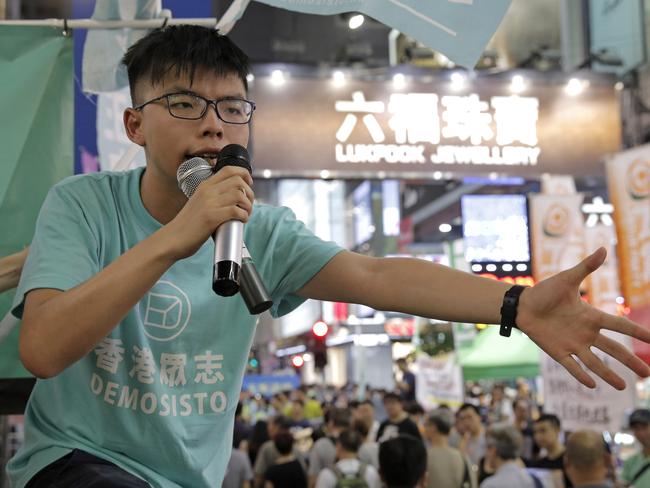
Mr Wong — who began campaigning for democracy when he was just 12 — is often vilified by China’s state media as a “black hand” conspiring with foreign forces to undermine the nation.
Beijing has been incensed by Mr Wong and others meeting western politicians and supporting sanctions in response to China’s tightening control over the city.
The new security law specifically outlaws lobbying for sanctions.
Mr Wong steered clear of any mention of sanctions in his remarks on Monday (local time), instead sticking to more general comments about not turning a blind eye to what is happening in Hong Kong.
“We also encourage the global community to let our voice be heard around the world,” he said.
The national security law is the most radical shift in how Hong Kong is run since it was handed back to China by Britain in 1997.
Under the handover deal, Beijing promised Hong Kong could keep key civil liberties, as well as judicial and legislative autonomy, for 50 years.
The new law has changed that landscape.
It empowers China’s security agents to operate openly in the city, toppling the legal firewall that has existed between the mainland’s party-controlled courts and Hong Kong’s independent judiciary.
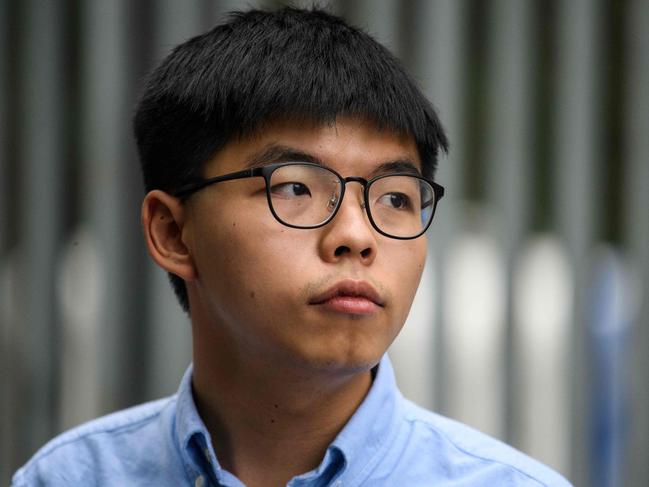
Beijing has also said it will have jurisdiction over especially “serious” prosecutions.
At a separate court hearing on Monday, local time, the first person to be charged with national security crimes was remanded into custody.
Tong Ying-kit, 23, has been charged with terrorism and inciting secession after he allegedly drove a motorbike flying a protest flag into a group of police last week, wounding three.
Video footage captured by local television showed a man on an orange motorbike with a flag that declared “Liberate Hong Kong, Revolution of our Times” on the back.
Arrested at July 1 protest, this 23yo first motorcyclist/ first-aider with a #LiberateHongKong flag became the first person in #Hongkong charged for “inciting sedition and terrorism†under #nationalsecuritylaw. He will appear in West Kowloon Court today. pic.twitter.com/UgbF7TDgkP
— Joshua Wong 黃之鋒 😷 (@joshuawongcf) July 3, 2020
He turned down a side street and drove into a group of riot police.
Bystander footage shot on a mobile phone captured a scene moments later, where the man was swiftly detained after he fell to the ground.
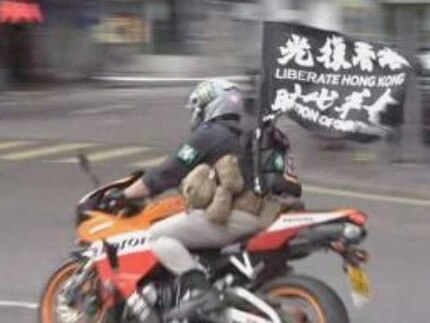
Beijing’s top envoy to the city — Liaison Chief Luo Huining — also joined Hong Kong officials in an inaugural meeting of a new national security commission.
Hong Kong’s mini-constitution forbids the central government in interfering with the day to day running of the city.
But in another unprecedented departure from traditions, Beijing says national security concerns trump that restriction.
China says the powers will restore stability after a year of pro-democracy protests, will not stifle freedoms, and will only target a “very small minority”.
Nonetheless police have arrested people for carrying slogans pushing independence or greater autonomy, and businesses have scrambled to scrub protest displays.
Public libraries removed a number of books written by dissidents, including a title by Wong, to review whether they complied with the new law.
Wong’s political party Demosisto announced it was disbanding last Tuesday. Its co-founder Nathan Law, another prominent former student leader, announced two days later that he had fled Hong Kong.
Wong has remained in the city, where he faces ongoing prosecutions over last year’s protests. He has pleaded not guilty.
FACEBOOK, WHATSAPP WON’T HAND DATA TO CHINA
Meanwhile, Facebook and its messaging service WhatsApp said on Monday they are suspending requests from the Hong Kong government and law enforcement authorities for information on users.
The pause will take place “pending further assessment” of the new law and would include “formal human rights due diligence and consultations with human rights experts”, a Facebook company spokesman said in a statement.

“We believe freedom of expression is a fundamental human right and support the right of people to express themselves without fear for their safety or other repercussions,” the spokesman said.
Digital rights group ProPrivacy called Facebook’s move “a win for both digital privacy and human rights in the region.” However it noted the move could lead to WhatsApp being blocked in Hong Kong as it has been in mainland China.
CHINESE-AUSTRALIAN ARTIST WARNS FOREIGNERS OF RISKS
Chinese-Australian dissident artist Badiucao has warned the world that not just Hong Kong residents will be at risk of losing their freedom under the tough new security law.
CNN reports that Badiucao, an artist who displays his political artworks, many of which are critical of the Chinese Communist Party, says he can no longer exhibit in Hong Kong.
In fact, he says he wouldn’t even transfer through Hong Kong airport for fear of being arrested under the city’s new national security law, known as Section 38.
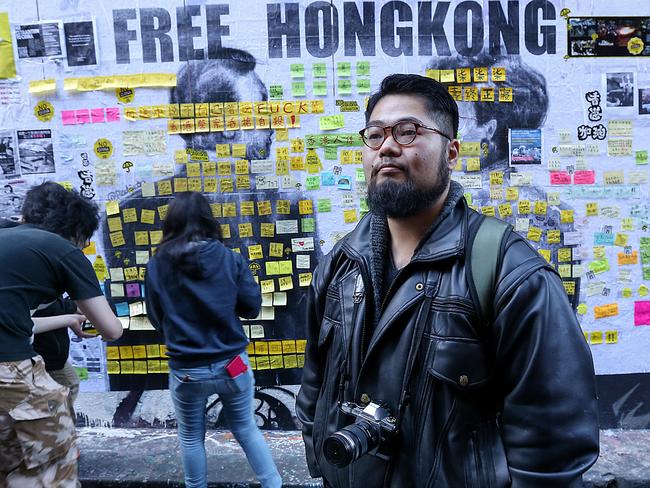
The legislation, which came into effect late on Tuesday, doesn’t only clamp down on freedoms of local residents.
It also puts foreign citizens who criticise the Chinese government anywhere in the world at risk of jail if they set foot in the city, even if they are just transferring through the airport, or on holiday.
“It’s really concerning and terrifying, not just for residents in Hong Kong but anyone who cares about human rights in Hong Kong and human rights in China, in general,” Badiucao told CNN from his home in Melbourne.
CHINA’S STERN WARNING OVER AUSSIE SAFE HAVEN OFFER
It comes as Beijing warned Canberra not to go down the “wrong path” after Prime Minister Scott Morrison announced Hongkongers may be offered a safe haven in Australia as protests sweep the former British colony.
It comes as The Australian revealed Cabinet is considering a proposal to offer Hong Kong nationals — who are wanting to flee China’s security crackdown — a fast track option to resettle through the skilled visa program.
Under the new law security laws, certain political views and symbols have become illegal – including showing support for Hong Kong, Taiwan, Xinjiang and Tibet independence.
Chinese Foreign Ministry spokesman Zhao Lijian said should look at the laws in an objective light and warned the Federal Government to stop interfering in China’s affairs.
“We advise the Australian side to look at the national security legislation in Hong Kong in a correct and objective light,” he said in Beijing.
“Stop interfering in China’s internal affairs with Hong Kong as a pretext, and refrain from going further down the wrong path.”
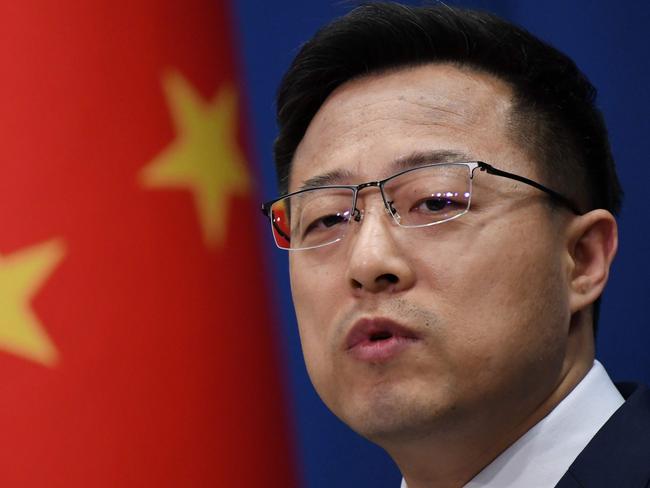
The comments from Mr Zhao echo those from the Chinese Embassy in Canberra.
The Embassy hit out yesterday after Foreign Minister Marise Payne raised concerns about tough new security laws that limit free speech and the right to protest.
“Hong Kong affairs are China’s internal affairs,” the embassy said.
“The Chinese government is firmly determined to implement ‘one country, two systems’ and oppose foreign interference in Hong Kong affairs.
“We hope the Australian side take an objective and rational view on the legislation, abide by international law and basic norms of international relations, and stop meddling in Hong Kong affairs and China’s internal affairs.”
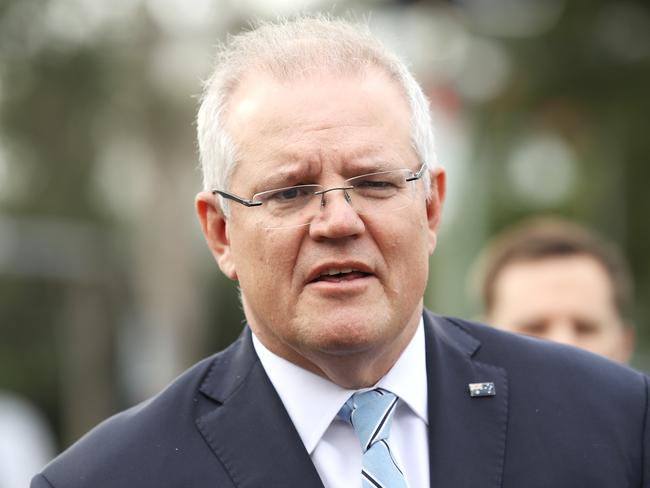
Earlier, Prime Minister Scott Morrison labelled the unrest in Hong Kong as “very concerning” and indicated Australia was willing to help Hong Kong citizens who find themselves in trouble.
It comes after British Prime Minister Boris Johnson extended Hong Kong residents a broader path to citizenship in response to China’s sweeping new security law for the former UK territory.
Asked whether he would consider offering a safe haven to those to those who find themselves in trouble, Mr Morrison said “yes”.
“We do find these events, very concerning and we’ve been very clear about our statements that are in concert with many other nations,” Mr Morrison said.
He said the government was considering similar proposals to those in the UK.
“We are considering very actively and there are proposals that I asked to be brought forward several weeks ago and the final touches would be put on those and they’ll soon be considered by Cabinet to provide similar opportunities and we think that’s important and very consistent with who we are as a people and very consistent practically with the views that we have expressed,” Mr Morrison said.
“When we have made a final decision on those arrangements then I’ll make the announcements, but are you asking are we prepared to step up and provide support? The answer is yes.”
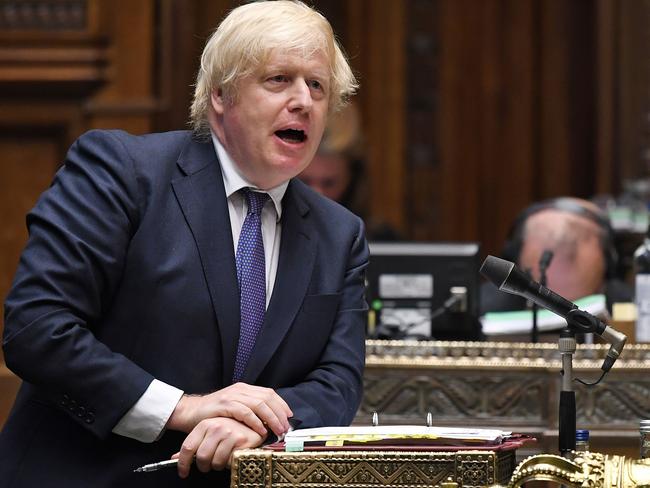
Earlier, Mr Johnson told the UK parliament just hours after China made its first arrests in Hong Kong under the new legislation: “We stand for rules and obligations.”
“The enactment and deposition of this national security law constitutes a clear and serious breach of the Sino-British Joint Declaration.”
Mr Johnson said London had warned Beijing that it would introduce a new route for those with British National Overseas status to move to the UK.
“And that is precisely what we will do now,” he said.
About 300,000 Hongkongers have BNO passports and another 2.6 million are eligible to apply.
UK Foreign Secretary Dominic Raab said the new national security law constitutes “a clear violation of the autonomy of Hong Kong, and a direct threat to the freedoms of its people”.
He said it was therefore “a clear and serious violation” of the Sino-British Joint Declaration, which laid the groundwork for the city’s handover from the UK to China in 1997 and stated that Hong Kong’s existing system of government would remain in place for 50 years.
AUSTRALIA MUST ‘RESIST’ AUTHORITARIAN CHINA: JOHN HOWARD
Former prime minister John Howard on Thursday warned China is becoming more authoritarian under President Xi Jinping’s leadership – and says the only way to deal with Beijing is to meet it with “resistance”.
Mr Howard said Beijing was increasingly determined to “throw its weight around” the Asia-Pacific region.
In an exclusive interview with Sky News Australia, Mr Howard said China has changed significantly since his tenure as prime minister.
“Under President Xi Jinping’s two predecessors, Hu Jintao Jiang Zemin, China’s attitude towards the west was very different,” he said.
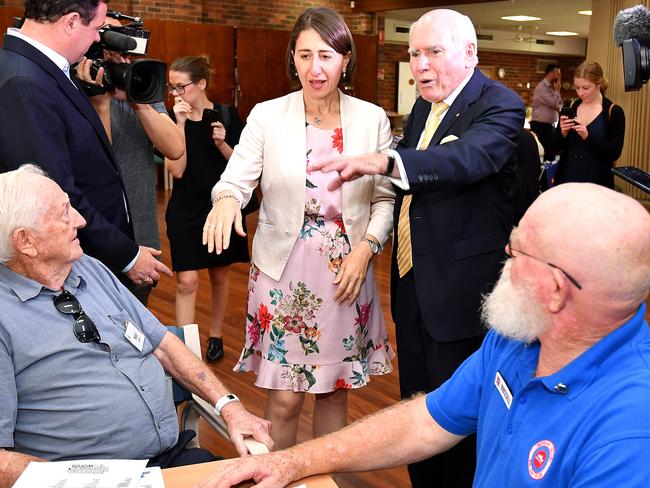
“They were both dedicated communist, Marxist, Leninist and so forth, no doubt about that, but they looked for co-operation, and you saw the possibility of building, pragmatically albeit, building a close relationship between the two countries and the west.
“But under Xi Jinping, China has become more authoritarian internally, it is more assertive in the region, it is throwing its weight around.
“And we have to recognise that, and consistent with that, continue to toil away at keeping the bilateral relationship together.
“It’s very important we don’t give up a practical relationship with China.”
Australia and China’s bilateral relationship has soured since the beginning of the COVID-19 crisis.
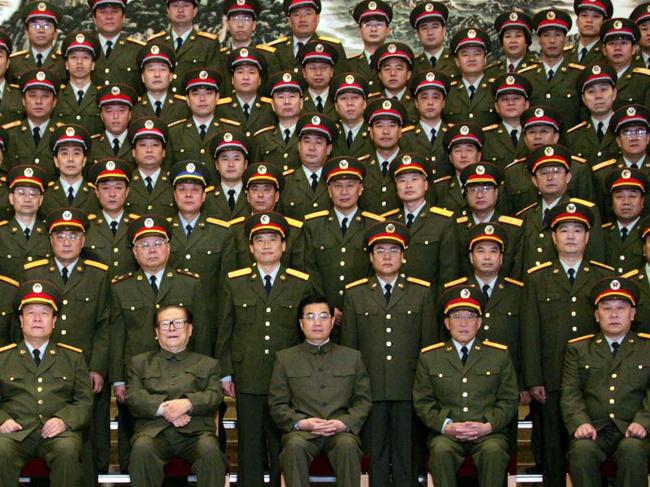
The worsening of trade relations comes as Australia was the first nation to call for an independent investigation into the origins of COVID-19.
China recently slapped an 80 per cent tariff on barley producers, banned four beef exporters and urged its students not to study in Australia.
Beijing has also been more assertive in the region, exemplified by its decision to make it illegal for anyone in Hong Kong to engage in secessionist, subversive, or “terrorist” activities.
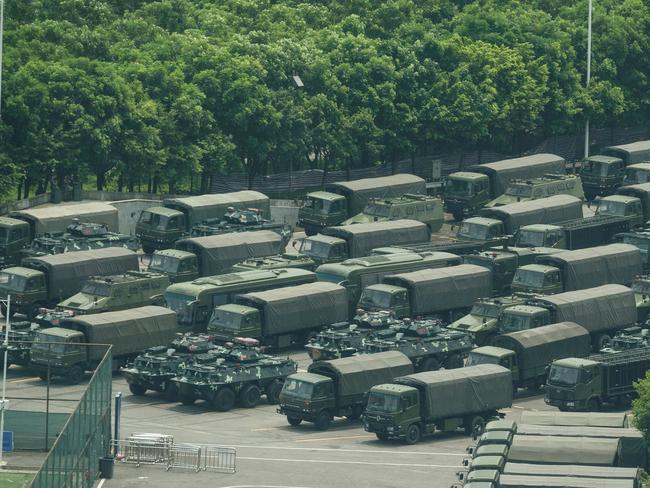
Experts claim the new law breaches the Sino-British Joint Declaration which was signed in 1984, which gave Hong Kong almost full autonomy for 50 years after Britain handed the territory back to China in 1997.
Mr Howard said the Morrison government was right to announce a $270 billion boost to defence spending in the wake of China’s growing bellicosity.
“My instinct is China has taken a different path under Xi Jinping and I would be surprised if it alters its attitude,” he said.
“It would be more likely to alter its attitude if it sees resistance, it’ll keep going in the same direction it is currently headed if it sees no resistance.
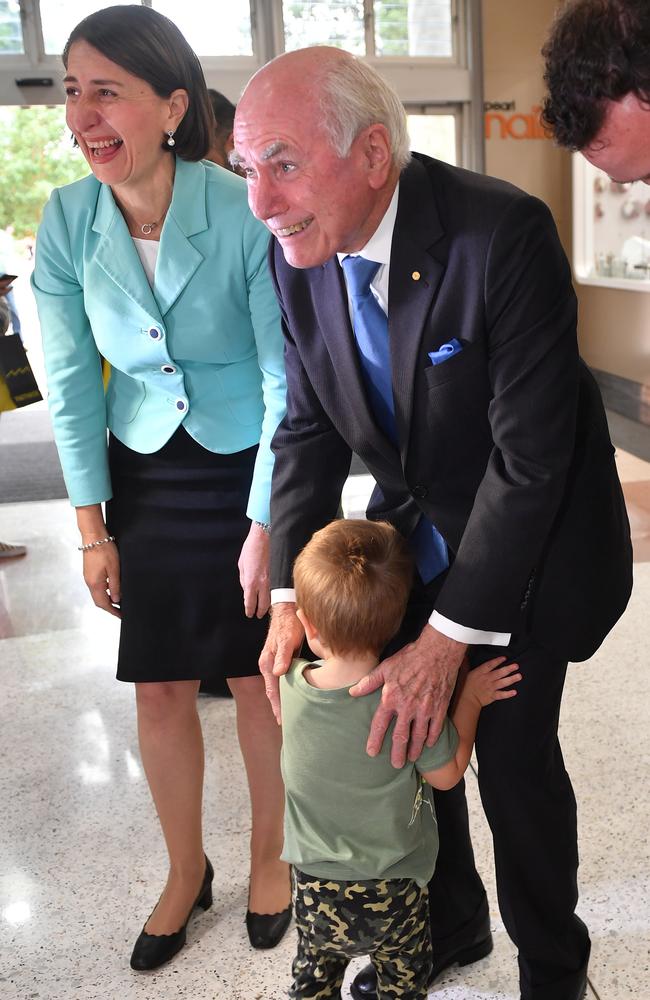
“And that is why I think the attitude taken by the government regarding foreign interference, I think the defence announcement made by the prime minister yesterday, they are all very important.”
HORRIFYING MOMENT HONG KONG COP STABBED AS VIOLENCE ERUPTS
On Thursday, chaos erupted on Hong Kong’s streets after China’s anti-protest “national security” laws came into effect, with one policeman being stabbed by a protester and hundreds arrested under the new statute.
Protesters have been out on the streets in defiance of China, which just passed a law banning protests and demonstrations in the semi-autonomous city.
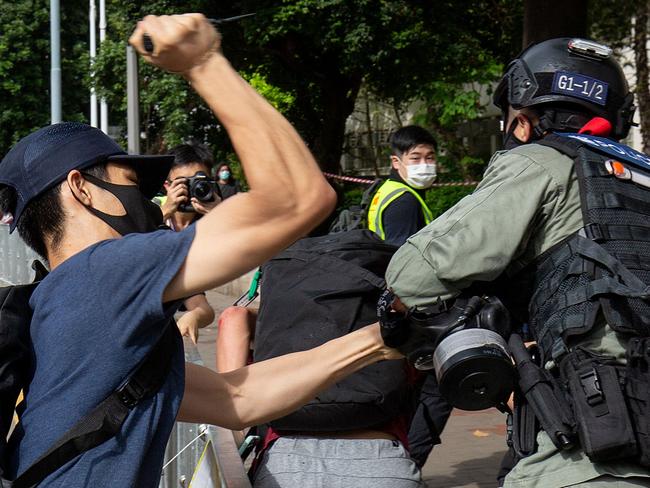
The police officer was pictured with a blood soaked shirt after someone put an approximately 3cm gash in his left shoulder.
HK Police posted pictures on Twitter of the officer being given stitches, saying he was stabbed by “rioters holding sharp objects.”
The suspects fled, while bystanders offered no help, police said.
In a tweet showing unfiltered pictures of the injuries Hong Kong Police Force wrote: “During a #HKProtest, an officer was stabbed in the arm by rioters holding sharp objects when he was taking arrest action.
“While the bystanders offered no helping hand, suspects fled. #HKPolice express the strongest condemnation against such violent act.”
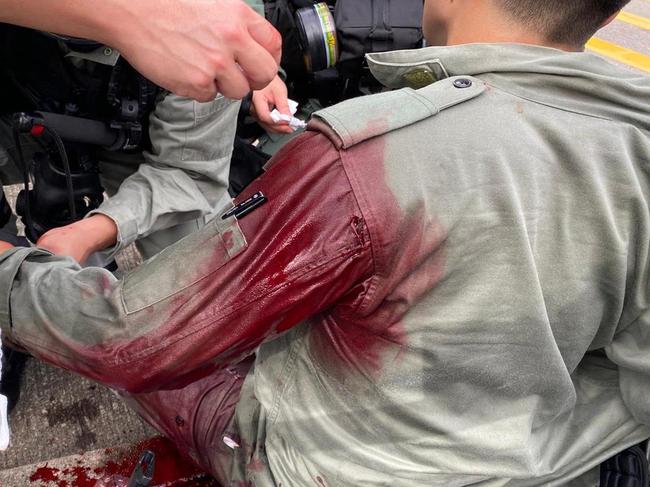
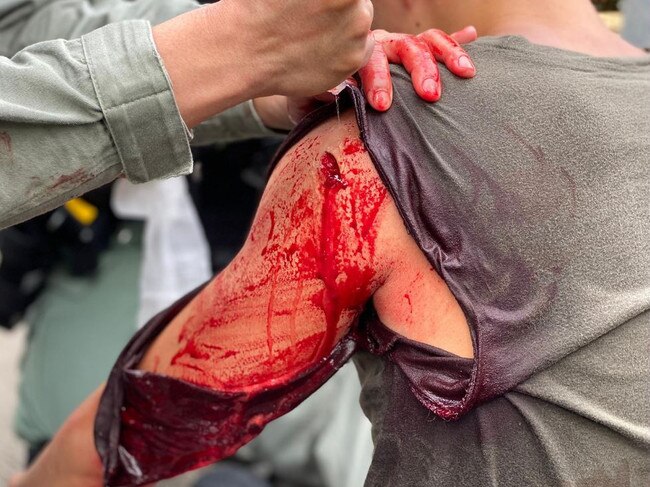
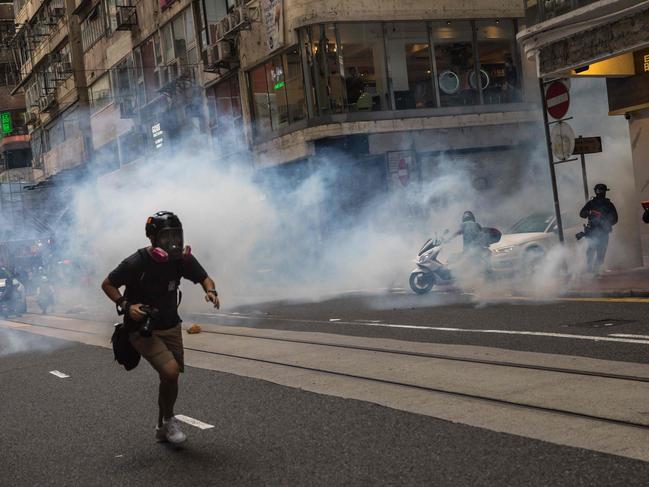
Hong Kong police fired a water cannon and tear gas to break up the first protest since China introduced sweeping security legislation.
More than 300 arrests have been made, the first under the new legislation while warning of punishment for calling for secession or subversion.
The new law makes secessionist, subversive, or terrorist activities illegal.
Anyone taking part in pro-independence activities, such as shouting slogans or holding up banners and flags, is in violation of the law.
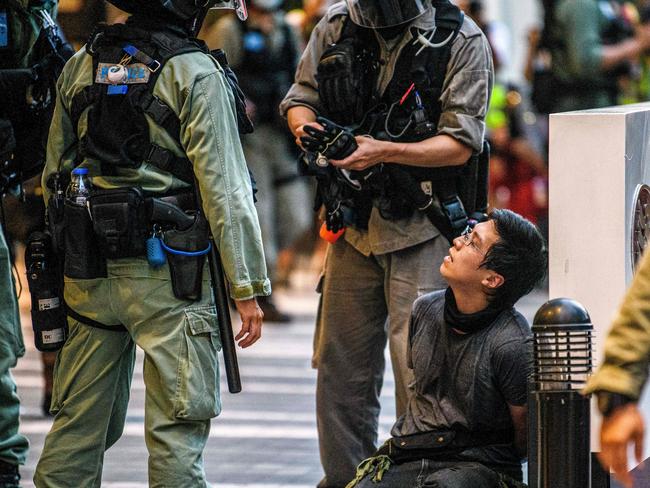
A man was detained for carrying a flag that called for independence, while a woman was also held for carrying a sign bearing the same message with a British flag.
Beijing only unveiled the details of the much-anticipated law late on Tuesday after weeks of uncertainty and years of public protest and international condemnation.
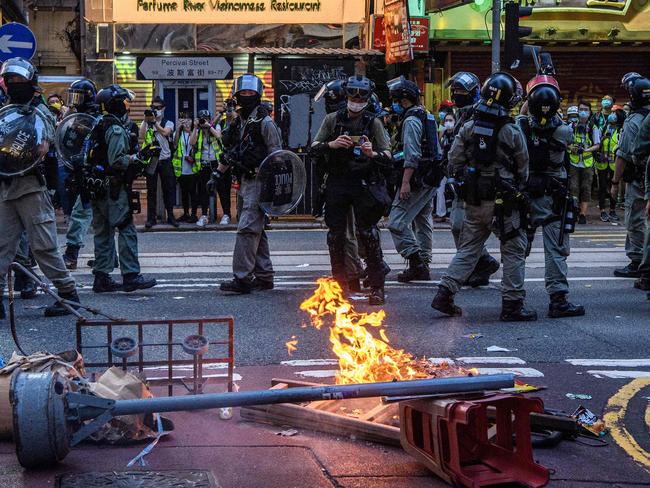
MORE NEWS:
COVID-19 death toll rises as fears around economic recovery persist
Desperate plea: World ‘must stand with Hong Kong’
Ghislaine Maxwell transferred to New York lockup as new victims come forward
Former British territory, Hong Kong, is China’s freest city and one of the world’s most glittering financial hubs, guaranteed under a “one country, two systems” rule.
However, the new law will punish crimes of secession, subversion, terrorism and collusion with foreign forces with up to life in prison.
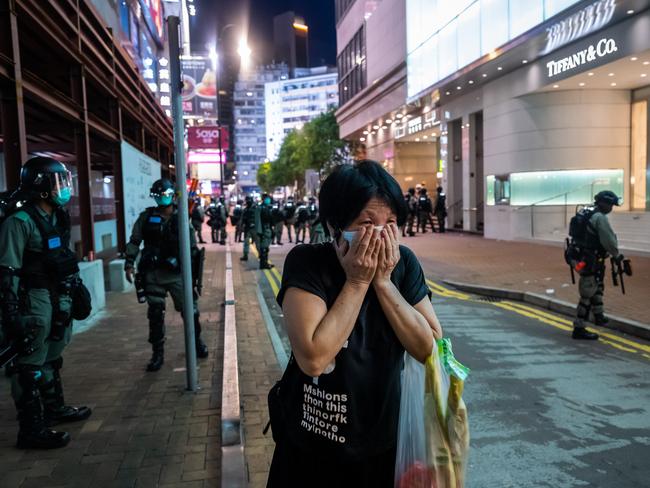
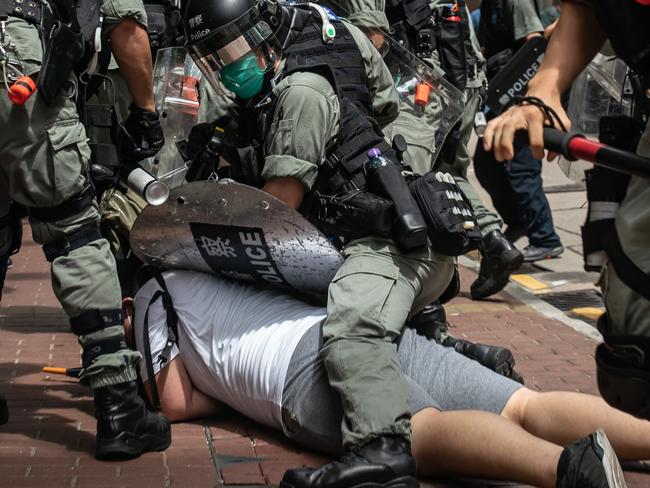
It will also see mainland security agencies in Hong Kong for the first time and allow for extradition to the mainland for trial.
Wednesday saw thousands of protesters gathering downtown for an annual rally marking the anniversary of the former British colony’s handover to China in 1997.
“You are displaying flags or banners/chanting slogans/or conducting yourselves with an intent such as secession or subversion, which may constitute offences under the national security law,” police said in a message displayed on a purple banner.
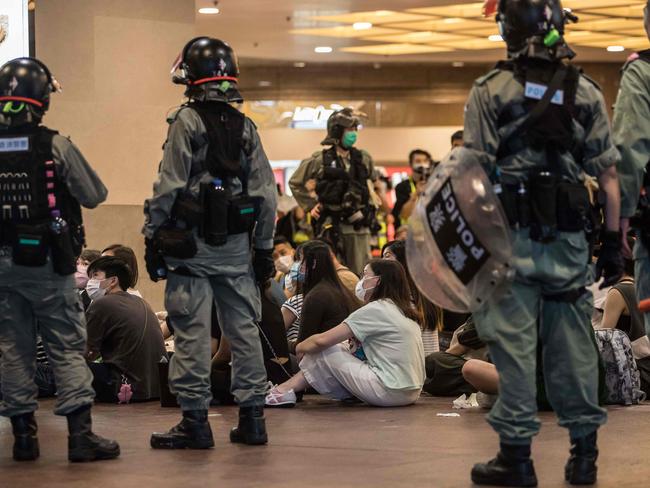
Riot police used pepper spray and fired pellets as they made arrests after crowds spilt out into the streets chanting “resist till the end” and “Hong Kong independence”.
Beijing-backed leader, Carrie Lam, said the law was the most important development since the city’s return to Chinese rule.
“It is also an inevitable and prompt decision to restore stability,” Lam said at the harbour-front venue where 23 years ago the last colonial governor, Chris Patten, a staunch critic of the security law, tearfully handed back Hong Kong to Chinese rule.
